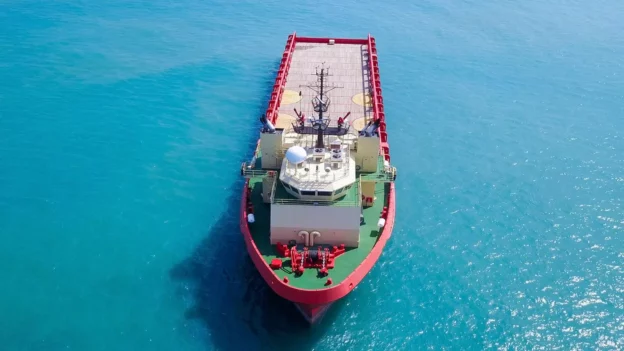The Norwegian company BW Offshore has decided to retire the floating production, storage and offloading (FPSO) vessel known as Petróleo Nautipa from its fleet. This FPSO vessel will be dismantled and recycled at the Baijnath Melaram facility in India, a site that complies with the Hong Kong International Convention for the Safe Recycling of Ships and is certified under ISO standards .
Initially planned for the end of 2023, the recycling process will be carried out under strict environmental and safety regulations. This FPSO vessel has been operational in the Etame field, off the coast of Gabon, under the management of Vaalco Energy from its conversion in 2002 until it ceased operations in 2022, after two decades of service during which the contract was extended several times beyond its initial term.
In August 2022, Vaalco announced plans to replace the FPSO with a double-hull tanker, the Cap Diamant, renamed Teli, which began operations in the third quarter of the same year. This change is part of a transition plan to a floating storage and offloading unit (FSO) managed by World Carrier Offshore Services.
Recycling of the Nautipa FPSO vessel
Likewise, BW Offshore has indicated that the elimination of the FPSO will free up approximately $9 million in liquidity . During the recycling period, BW Offshore will maintain staff on site to monitor compliance with health, safety and environmental regulations and a bonus will be paid for safe recycling, thus incentivizing proper and safe practices.
The recycling facility in India, in addition to preparing a detailed recycling plan, will follow all relevant regulations to ensure an incident-free process. This is particularly important given the precedent of a fatal accident in 2022 at another Indian shipyard during the scrapping of a former BW Offshore FPSO, although the company clarifies that this incident was not directly related to its operations .
This focus on safe recycling reflects a commitment to environmental responsibility and can also serve as a model for other companies in the oil and gas industry. Adopting safe and efficient recycling practices could be crucial to minimizing the environmental impact of decommissioning offshore infrastructure as the industry adapts to renewable energy and changes in global energy demand.
Follow us on social networks and don’t miss any of our publications!
Inspenet.com YouTube LinkedIn Facebook Instagram X
Source: offshore-energy.biz
Photo: shutterstock

